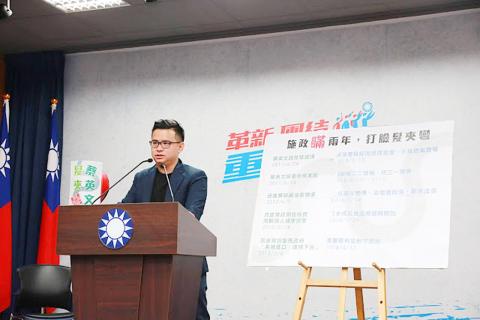The Chinese Nationalist Party (KMT) yesterday lampooned President Tsai Ing-wen (蔡英文) ahead of the second anniversary of her inauguration, saying that her administration has failed to deliver on campaign promises on livelihood issues.
Tsai should sincerely apologize to the Taiwanese when she makes her anniversary speech on Sunday, KMT spokesman Huang Chien-hao (黃健豪) told a news conference at the KMT’s headquarters in Taipei.
Tsai has said she has a “soft spot” for the nation’s workers, but her administration pushed for the “one fixed day off and one flexible rest day” scheme and the abolition of seven national holidays with its amendments to the Labor Standards Act (勞動基準法), Huang said.

Photo courtesy of the Chinese Nationalist Party
The government then flip-flopped and amended the act again, canceling the rule requiring one mandatory rest day for every seven consecutive days of work and reduced the rest time for shift work for approved sectors, he said.
“These changes have led to an increase in overwork,” he said.
The government on May 1 said an average worker’s monthly salary is NT$49,989, and it more recently claimed that the actual average income for this quarter is NT$59,852, but about half of workers are actually paid less than NT$36,000 per month, Huang said.
Tsai vowed to create a transparent government and has criticized former president Ma Ying-jeou (馬英九) for ignoring the will of the people, but her government has built bigger barriers against protestors than any other administration, Huang said.
When the Democratic Progressive Party (DPP) was in opposition, Tsai promised to not hike electricity rates for 10 years, while the DPP blasted the KMT for raising the price of electricity and gas, he said.
Electricity rates have gone up by an average of 3 percent for businesses that use up to 500 kilowatt-hours per month, he said.
“Two years into Tsai’s presidency, prices for consumer products, gas and electricity have gone up, but salaries have not,” he said.
The DPP originally proposed to phase out nuclear power and reduce the nation’s reliance on coal, but the Tsai administration has opted to build a new coal-fired plant in New Taipei City, instead of the initially planned natural gas-fired plant, Huang said.
Her administration has also decided to reactivate one reactor each at the Guosheng and Ma-anshan nuclear power plants, even though building a “nuclear-free homeland” is a DPP slogan, he said.
As an opposition party, the DPP criticized the Ma administration’s plan to allow food imports from five Japanese prefectures following the Fukushima Dai-ichi nuclear disaster in 2011, but is now considering allowing such imports, he said.
It also resisted the KMT’s proposal to allow US pork imports, but the Tsai administration has also reversed its position on that issue, Huang said.

Palauan President Surangel Whipps Jr arrived in Taiwan last night to kick off his first visit to the country since beginning his second term earlier this year. After arriving at Taoyuan International Airport at around 6:30 pm, Whipps and his delegation were welcomed by Minister of Foreign Affairs Lin Chia-lung (林佳龍). Speaking to gathered media, the Palauan leader said he was excited and honored to be back in Taiwan on his first state visit to Taiwan since he was sworn in this January. Among those traveling with Whipps is Minister of State Gustav N. Aitaro, Public Infrastructure

President William Lai (賴清德) yesterday thanked Palau for its continued support of Taiwan's international participation, as Taipei was once again excluded from the World Health Assembly (WHA) currently taking place in Switzerland. "Palau has never stopped voicing support for Taiwan" in the UN General Assembly, the WHO and other UN-affiliated agencies, Lai said during a bilateral meeting with visiting Palau President Surangel Whipps Jr. "We have been profoundly touched by these endorsements," Lai said, praising the Pacific island nation's firm support as "courageous." Lai's remarks came as Taiwan was excluded for the ninth consecutive year from the WHA, which is being held in

RESOLUTIONS DEBATE: Taiwan’s allies said that UN and WHA resolutions cited by China and other nations ‘do not determine Taiwan’s participation in WHO activities’ A proposal to invite Taiwan to this year’s World Health Assembly (WHA) was rejected on Monday, resulting in Taipei’s absence from the annual meeting for a ninth consecutive year, although partners spoke up for Taiwan’s participation at the first day of the meeting. The first agenda item after the opening was a “two-on-two debate” on a proposal to invite Taiwan to participate at the WHA as an observer. Similar to previous years, two countries made statements in favor of the proposal, while two others expressed their opposition. Philippine Secretary of Health Teodoro Herbosa, president of the 78th WHA, accepted the WHA General Committee’s

At least three people died and more than a dozen were injured yesterday afternoon when a vehicle struck a group of pedestrians in New Taipei City’s Sansia District (三峽). The incident happened at about 4pm when a car rammed into pedestrians at an intersection near Bei Da Elementary School. Witnesses said the sedan, being driven at a high speed, ran a red light, knocking scooters out of the way and hitting students crossing the road before careening into a median near the intersection of Guocheng and Guoguang streets. The incident resulted in three deaths and 13 injuries, including the driver, a 78-year-old man